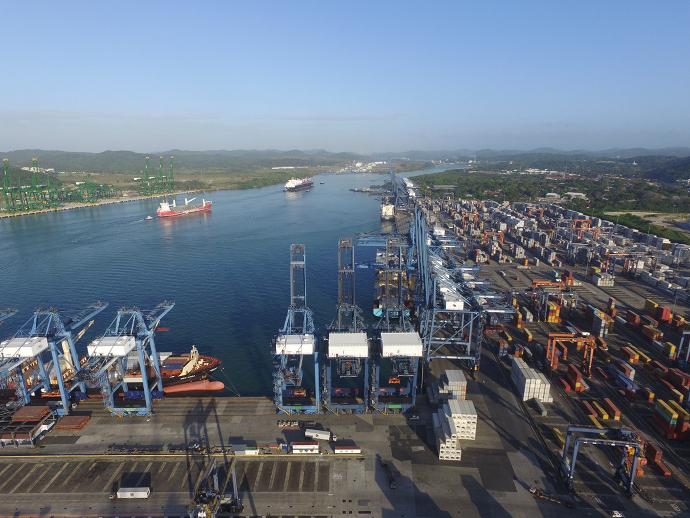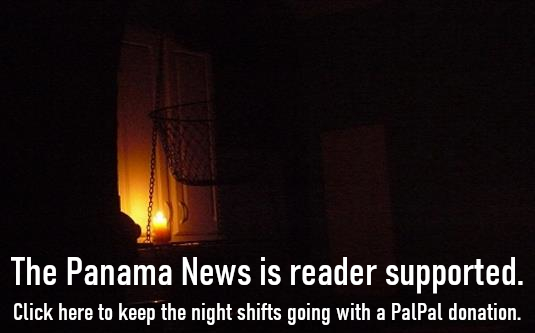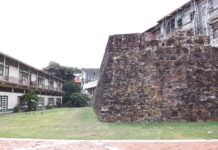“The door is not closed. The government, through the presidency and the National Assembly, can make the changes it wants.” Julio De La Lastra, CoNEP leader and once a member of the Panama Maritime Authority board.
Blogging today’s La Estrella interview
comments by Eric Jackson
Here, in an interview conducted by La Estrella’s Adelita Coriat we have National Council of Private Enterprise president Julio Azael De La Lastra Alemán. The interview is in Spanish, but there are machine translation programs to help those who can’t read Panama’s national language.
The talk gets into the Panamanian social security system and other subjects, but the main thing of interest is the recently renewed concession with a Hong Kong based company for the ports of Cristobal and Balboa. There are other, competing seaports on each side of the isthmus now, but this double concession remains the crown jewel of Panama’s ports industry.
We get a business point of view about the Panama Ports contract for the ports of Balboa and Cristobal, which the Cortizo administration has renewed rather than renegotiated. Those who object say that Panama Ports, a subsidiary of Hong Kong based Hutchison Ports, has paid a relative pittance to Panama over its 25-year concession for the ports. De La Lastra says that the 1997 contract gave Panama a binary choice: renew the contract after 25 years or cancel it. Others suggested to cancel it, and to start new talks with the company about a replacement.
De La Lastra has a conflict of interest about getting into some of the particulars of the Panama Ports relationship with the government, given that he was on the Panama Maritime Authority (AMP) board when many of these details would have been broached. As he notes, under AMP customs there are things he just can’t talk about. But not so for other members of CoNEP and for the business sector in general. De La Lastra does get suggestively scathing with respect to the Comptroller General’s office, which for many years did not publish any audits of the concessions. He wonders how closely that office looked at the subject before signing off on the decision to renew the concession.
The company can truthfully talk about huge investments that they made, and the country can point to all the years when we received little or nothing, based on the company’s accounting that said it wasn’t profitable.
In the USA there is this conspiracy cult that supposes that the ports of Balboa and Cristobal are now outposts of the Chinese military forces. It isn’t true as alleged, much less the allegation that China runs the Panama Canal. However, the rise of Chinese business, maritime logistical and naval power does provide some matters of fact that reasonable people might discuss.
Hutchison is one of the world’s largest seaport companies and has very few Chinese workers or management people here. But China is a major user of the canal, and one of the principal ways into many a Chinese maritime company runs through service in the People’s Liberation Army Navy (PLAN). The PLAN rivals the US Navy as probably the world’s second largest naval force by tonnage, the largest by personnel on surface ships, and a major contender of generally unknown rank in the highly secretive field of naval technologies. The Chinese are also developing a People’s Armed Forces Maritime Militia — the “little blue men” — presently identified as an armed force that largely operates under the guise of fishing vessels. Management figures of Chinese civilian shipping companies often have military backgrounds.
The man who sounded the alarm about Hutchison getting the ports contract back in the 90s, the late US Army Major General and former USARSO commander Richard Anson, talked caution rather than paranoia. Others spun fanciful suppositions about then-present realities. Anson pointed out that from a military point of view one looks at a potential enemy not by its present intentions but by its capabilities.
In any case, here we have a matter of Panamanian business sense rather than US perceived security concerns. It a concern that the Panama Ports contract may be a bad business deal for Panama. In the present Panamanian political situation the ports concession is often mentioned in tandem with mining concessions, and held up by some prominent business leaders as one of the examples of how notwithstanding the business backgrounds and orientations of people who get elected, this and previous governments have not competently looked after Panama’s business interests.
Hence Mr. De La Lastra’s suggestion that the legislature amend the concession contract rather than just approve it as presented.
Contact us by email at fund4thepanamanews@gmail.com
To fend off hackers, organized trolls and other online vandalism, our website comments feature is switched off. Instead, come to our Facebook page to join in the discussion.
These links are interactive — click on the boxes













